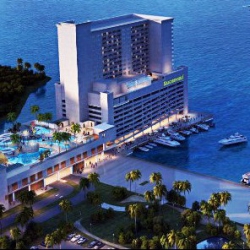
Casino Magic, which opened in 2012 but went bankrupt in 2014, is a good example of why the Gaming Commission limits the number of casinos.
The Mississippi Gaming Commission rejected the license applications for RW Development casinos planned for Biloxi and Diamondhead. Hours later, a spokesman for RW Development, which put forward the Biloxi casino plan, said the company was “shocked” by the rejection.
One of the major points of contention was the definition of the “mean high water line” in building seawalls. While seawalls are of no concern to most casino developers, they are pivotal with Mississippi Gulf Coast casino developers after the Hurricane Katrina disaster.
RW Development Defends Its Plan
Later in the day, the development company continued to express bewilderment and dissatisfaction in a published statement. The RW Development release said, “All of the expert testimony submitted at the February hearing supported approval of the seawall as the State’s ‘mean high water line’ for starting the 800 feet required for gaming sites.”
The RW Development statement continued, “We are concerned that the meeting was adjourned without any explanation of the decision and that the scheduled public comment on the agenda was canceled without notice.”
Gulf Coast Casinos after Katrina
The discussion of the seawall requirements were a reference to the standards the Mississippi Gaming Commission placed on casinos based on the Gulf Coast. When Hurricane Katrina hit in 2006, Mississippi’s casinos were not prepared for a Category 5 hurricane and they sustained massive damage. It took months for Biloxi and Gulfport casinos to re-open.
The commissioners’ decision not to go on the record with their reasons for the rejection seemed to occupy the casino executives’ minds.
March Mississippi Gaming Commission Meeting
The various parties met at the Hard Rock Casino Biloxi for a 90-minute hearing before the Gaming Commission. It was the commission’s regularly scheduled March hearing. Various people spoke at the meeting, including RW Development planners, local residents, gaming executives, and lawyers for various sides of the debate.
After the commission deliberated, MGC Executive Director Allen Godfrey recommended the two license applications be denied. Fellow commission members Tom Gresham, Jerry Griffith Sr., and Chairman Al Hopkins all voted to deny the two sites.
Silence as the Decision Was Announced
When the announcement was made, it was met by silence from the assembled. While RWD’s spokesmen claimed to be shocked and those in attendance also seemed surprised, the denial of the development plan did not come as a great shock to those who have followed the Gaming Commission’s decisions over the past few years.
The Gaming Commission voted against Jacob Entertainment’s Diamondhead site when it was presented to the commission in 2014. The same men denied an application from RW Development’s Bixosi casino plan on U.S. 90 when the company applied in 2008. Hopkins, Gresham, and Griffith Sr. were new commissioners, though, so RW Development decided to re-file its applications last year, hoping for a better result this time.
When officials began to talk of the rejection later in the day, they hinted at the bickering which had characterized the run-up to this week’s meeting. Business and civic proponents for RW Development’s Biloxi site and Jacob Entertainment’s Diamondhead site exchanged public words, because they were viewed as rival claimants. Most believed the decision would lead to approval for one or the other casino, but not both. In the end, both sides were denied.
“Passion on Both Sides”
Diamondhead Mayor Tommy Schafer said of the decision, “There was passion on both sides.” They mayor called for cooperation in the future from both sides.
Frank Faulstich took some positives from the Gaming Commission’s decisions, though. Mr. Faulstich said, “Diamondhead does have a legal, approved site for a casino (to the east of the site for which Jacobs requested approval). I just hope this brings finality to the Jacobs site being a legal site.”
Michael Cavenaugh, an attorney for both developers, has twenty days to appeal the decision. Cavenaugh said he wanted clarity from the state legislature on the “mean high-water line”, because the law remains unclear. Cavenaugh said, “I’d just like to apply the law.”
Rep. Richard Bennett Lauds the Gaming Commission
Richard Bennett, the chairman of the Mississippi House of Representatives Gaming Committee, said he agreed with the decision by the gaming commission. Chairman Bennett seemed to take umbrage with RW Development’s insinuation that the commissioners had something to hide, or there was some other reason for scandal. Saying Mississippi had regulated casino gambling for 25 years without the hint of scandal, Bennett added, “The industry knows what the rules are and they’re still the rules. This would have been a terrible precedent to change what we’re doing.”
Like Richard Bennett, Mississippi Gaming & Hospitality Association deputy directer Michael Bruffey lauded the efforts of the Gaming Commission. Mr. Bruffey suggested that the commissioners followed precedent and the casino developments might have been trying to skirt laws about the mean high-water line, saying, “We are pleased to see the commission honoring the intent of our Legislature. It is likely there will be a time when we will need our legislature to support our industry in the future, and we think it is essential that our legislators know that we will abide by and defend their expressed intent when they come to our aid.“
